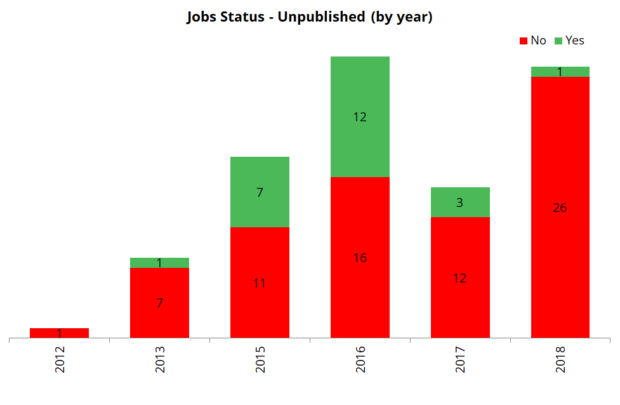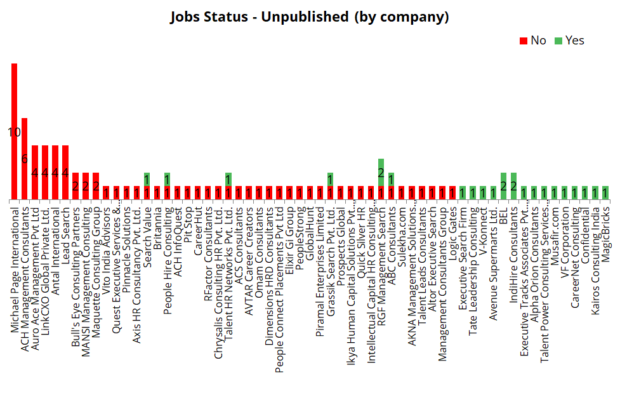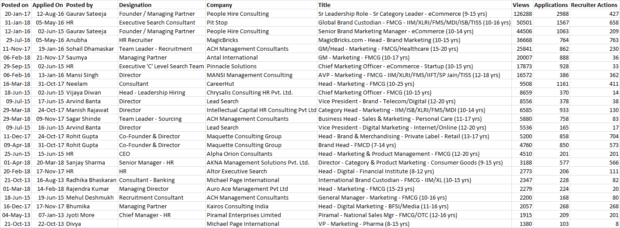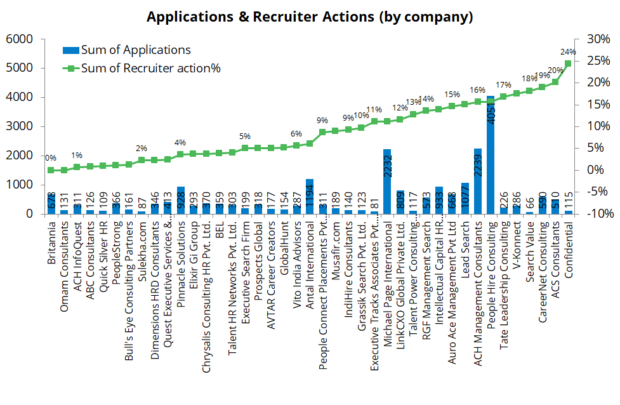I have been using IIMJobs to search for Jobs for some time now. Why? Firstly, there is IIM in the name and it was started by an IIM alumnus. Secondly, I have been completely disillusioned by authenticity and quality of jobs being posted Naukri and Monster for a while now.
But of late, I have started to get disillusioned by both IIMJobs and LinkedIn as well. Why? The hit rate of getting a call back using either of these sites is abysmally low. It may also have to do with my work experience vis-a-vis the job requirement as well as how my resume was written. But I have reasons to believe that this may not be the case. So, I went looking for data of the jobs I’ve ever applied (N=97) on the IIMJobs portal to see what was happening.
1. Overall only 1 in 4 jobs posted get unpublished: This trend is amazingly consistent across job posting firms. Be it Indian placement firms like ACH or international ones like Michael Page, these job posters seem to routinely forget to unpublish job listings once they’ve received enough application or once the vacancy has been filled. In fact, Michael Page posted the maximum number of jobs for which I applied and none of them have been unpublished. What’s worrying is that even HR people from companies like Britannia, who are best placed to know when a vacancy has been filled, don’t unpublish these jobs. So much for professionalism!


While IIMJobs itself has acknowledged that people apply to jobs posted months ago, noticing this trend and not taking any action on this itself is telling on their part.
2. Some job posters keep re-posting the same job: Reposting a job withing a few days – maybe a month – is ok if not many appropriate candidates have applied. But reposting the same job months and years later is not. The following are a few jobs I applied for where the date of application in the second column. The day on which the job was posted – in the first column – is after my application date, clearly indicating that the opening was reposted. This posting date combined with the number of views and application statistic say something about these openings. Don’t they? There are some job posters who have been doing it consistently – Gaurav Sateeja (People Hire Consulting), Rohit Gupta (Maquette Consulting Group), Arvind Banta (Lead Search) and someone from a recruitment firm called Pit Stop.
 I don’t know how the back end / recruiter interface for a posting on IIMJobs works to allow this, but this is another telling aspect of how well the IIMJobs site is run.
I don’t know how the back end / recruiter interface for a posting on IIMJobs works to allow this, but this is another telling aspect of how well the IIMJobs site is run.
3. The actions taken by job posters are abysmally low: A couple of job posters didn’t even download or view an application. And about 70% of job posters viewed or downloaded resumes of only 1 of 4 applicants. This is surprising because going by this view (blog post here) of what a job poster sees, not much information can be gleaned about an applicant.
 Again, I would assume that a recruiting agency, by nature of the industry it is in, should be capable of screening hundreds of applicants if they are posting on such a public site. But it’s alarming to see that 1 in 2 placement firms download 50 resumes or less and 1 in 3 placement firms download 20 resumes or less!
Again, I would assume that a recruiting agency, by nature of the industry it is in, should be capable of screening hundreds of applicants if they are posting on such a public site. But it’s alarming to see that 1 in 2 placement firms download 50 resumes or less and 1 in 3 placement firms download 20 resumes or less!
The last time I went job hunting, in 2012, I religiously maintained a spreadsheet noting down which site I applied on, when I applied on, the contact details of the poster, the number of times I followed up via email or phone and when, the call backs as well as the shortlists I got. My hit rate of landing an interview call was 2% of jobs applied for! This was also because I happened to personally know the posters of the job.
Usually when someone is visiting Naukri/Monster/IIMJobs they tend to trust that only genuine people and genuine jobs are being posted. But this might not be the case anymore.
So how can one be sure that their applications aren’t being wrongly gathered? Here are 3 tips for applying on IIMJobs or for that matter any job site (in increasing order of desperation :)) learned the hard way.
- Look for the contact details of the job poster (this applies to international placement agencies like Michael Page). Call them up first and only send you resume after you reassure yourself that the poster is genuine and the job description matches what you are looking for.
- Review the company and profile of the job poster. If the company website doesn’t exist or looks unprofessional. Don’t submit your resume.
- Look at the details of when the job was posted and how many people viewed, applied and how many actions were taken by the poster. If you find there have been thousands of views and applications, chances are, it is a fake listing. If the recruiter has viewed very few applications (I would say 25% or less), don’t apply.



